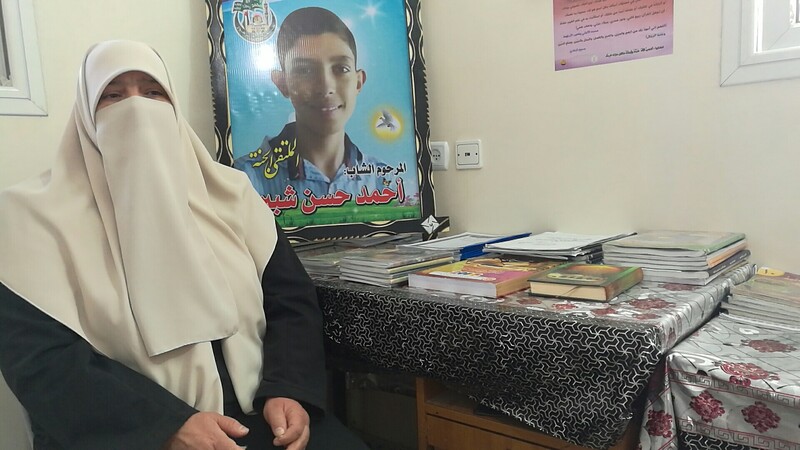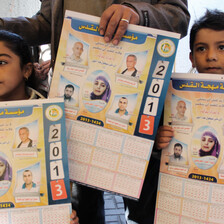The Electronic Intifada Gaza Strip 5 April 2017

Amal Shubeir’s son Ahmad, who was born with a heart defect, was denied a permit to travel for medical treatment after his family refused to collaborate with Israeli intelligence. He died in January. (Image courtesy of the Shubeir family)
When you walk through the front door, the first thing you see is a large photograph of a smiling teenager. It’s homely and warm, the kind of thing you would see in a happy house.
But this is not a happy house.
The house belongs to the lawyer Hasan Shubeir, 54, and the photograph is of his son Ahmad, who died of heart failure in January at the age of 17. But that, his father says, only tells a fraction of the story. Ahmad may have had a heart condition, but he was really the victim of Israeli blackmail.
Stories like that of Ahmad Shubeir are not unusual in Gaza. Shut off from the rest of the world and with a health infrastructure in tatters, Palestinians in Gaza with specialized or acute medical needs have to rely on outside health care.
That mostly means traveling to Israel or the West Bank and requires permission from the Israeli military, which has operated a highly restrictive permit regime since 2003. Consequently, say human rights activists and families, patients and their relatives are vulnerable to blackmail and pressure to spy for Israel.
This is not a new phenomenon, and the group Physicians for Human Rights-Israel has been keeping tabs on such coercion, especially as it relates to Gaza. According to their latest report, Palestinian medical patients face a trend of “continued interrogation,” exacerbated by a “disconcerting rise” in the number of medical permit applications rejected in 2016.
Old enough to collaborate
It is what happened to Ahmad, his father told The Electronic Intifada.
Ahmad was born with a congenital heart defect that needed regular treatment in Israel. He went there some 40 times during his short life, according to his family.
December 2015, says the family, marked the first attempt by officers of the Israeli Security Agency – Israel’s domestic intelligence agency also known as Shabak or Shin Bet – to pressure the child and his mother, Amal, 40, who was accompanying him to the Erez checkpoint, to spy for Israel. Evidently, the family speculates, he had come of age and was seen as a potential collaborator.
Throughout 2016, even as his condition worsened, the pressure grew. Permits to enter Israel, which the child had always been able to obtain, suddenly stopped being issued. Ahmad and his mother did make one final visit to the Tel Hashomer hospital in Tel Aviv in April 2016 to prepare him for the open-heart surgery scheduled for September. But that was the last time he was allowed across.
Permits to travel for the operation were denied. Instead, the family received a summons for questioning with the Israeli Security Agency at the Erez checkpoint.
Amal has told her story to B’Tselem, the Israeli human rights organization. She and her husband both allege that in November 2016, Ahmad and his father went early in the morning to the Erez checkpoint where they were to endure a 12-hour “interrogation,” in the words of Hasan, intended to turn one or both into spies for Israel.
They both refused. “We care for our country and our people more than you do,” Hasan said he told the intelligence officer.
No permit was issued to Ahmad again, even though appointments were repeatedly made at the Tel Hashomer hospital. Then, on 14 January 2017, Ahmad woke up early and helped his mother do some house work. Tired, he went back to bed.
“He closed his eyes and never opened them again,” his mother said. “He died, just like that.”
Cruel, inhuman, degrading
The permit regime and Israel’s control over movement makes the Erez checkpoint a “trap” for vulnerable patients and their relatives, according to Issam Younis, director of Al Mezan Center for Human Rights.
Al Mezan counted 44 arrests at the Erez checkpoint in 2016, among them four patients, according to Younis, while hundreds were simply denied permission to pass for “security reasons.”
B’Tselem reported in December that the number of would-be patients being summoned for questioning at the Erez checkpoint spiked dramatically last year, with 601 medical permit applicants being asked in for interrogation in 2016, compared to 146 in 2015 and 179 in 2014.
Meanwhile, Physicians for Human Rights-Israel has denounced a “disconcerting rise” in the number of permit applicants being turned down, calculating that the rate at which permits are issued dropped by about 13 percent compared to 2015.
Al Mezan found a steeper nearly 17 percent decrease in the rate of permits issued and calls the treatment of patients at Erez “cruel, inhuman and degrading.”
The human rights group has called for an independent investigation into Ahmad’s death and other similar cases.
Two such cases are those of Nirmeen Abu Yousif and Zein al-Deen Samour.
In 2014, Abu Yousif, a mother of two, passed out. Then she did so again. When these losses of consciousness kept recurring, she went to the hospital. Doctors diagnosed her with an advanced liver ailment caused by hepatitis C and determined that she needed an emergency transplant. After much delay at Erez, she was initially referred to An-Najah National University Hospital in Nablus, where doctors were unable to help her.
After some procrastination – her husband is a member of Hamas – the office of Palestinian Authority leader Mahmoud Abbas in Ramallah eventually helped facilitate her transfer to Hadassah hospital in Jerusalem. But there she languished while her sister Samira, the putative organ donor, was unable to secure a permit to get to Jerusalem.
It was then, said her husband Luay Qufaisha, 35, he started receiving phone calls from an Israeli intelligence office.

Nirmeen Abu Yousif was buried in Turkey after her death in February 2016. (Photo courtesy of Luay Qufaisha)
Qufaisha had been part of a prisoner release deal in 2011 that saw him forcibly transferred to Gaza. His 10 years in jail – he was convicted of the killing of an alleged Israeli spy in his native Hebron in the West Bank – had left him accustomed to dealing with interrogators, but he was still shocked that he was being blackmailed over his wife’s health.
“He was bargaining with me over the life of my wife to be a spy,” Qufaisha told The Electronic Intifada, while flicking through an album of photos of his late wife.
The bargaining failed. And even though Abu Yousif’s father, through Prime Minister Rami Hamdallah’s office in Ramallah, secured passage for Nirmeen for treatment in Turkey, it was too late. She passed away after arriving in Turkey in February 2016.
Samira now helps care for the couple’s two children, Nafez, 4, and Eileen, 2.
“I miss her. And my heart breaks every time the children ask about her and when she is coming back.”
Long road to justice
Zein al-Deen Samour was born with a congenital heart condition that caused doctors in Gaza to immediately refer him for treatment in Israel. In January 2013, Hidaya al-Tattar, 28, Zein al-Deen’s mother, took the infant to Tel Hashomer hospital in Tel Aviv where he received what was supposed to be the first in a series of procedures on his heart.
She was sent home with instructions to bring the child back in two years. Eight months after that visit, Hidaya told The Electronic Intifada, she received a phone call from a woman who said she worked at the Erez checkpoint.
Hidaya was immediately suspicious. The woman knew about Zein al-Deen’s heart condition and offered assistance. On condition: “Help us and we will help you,” is how Hidaya remembered the pitch.
Hidaya did not accept. But when she next tried to secure a permit for Zein al-Deen it was denied. Her sole option was to seek treatment elsewhere, but the only other exit from Gaza is through the Rafah crossing to Egypt, only intermittently open.
By the time Hidaya and Zein al-Deen managed to cross, time had run out. The boy died in February 2016, in Turkey, during a procedure that came too late.
“They asked me to sell my homeland and people for my baby’s life,” Hidaya said.
Her husband, Sharif, 35, said “I hold Israel accountable. I want those responsible to be tried in an international court. These are crimes against humanity.”
Whether the family will ever see any such investigation is highly unlikely, however. Israel regularly cites security risks as justification for preventing patients from receiving treatment, security risks that Israeli law does not compel the military to explain.
But for Palestinians, the pressure and extortion brought to bear on the vulnerable is a clear violation of human rights standards, said Ramy Abdu of the Euro-Mediterranean Human Rights Monitor.
“Israel has exploited the suffocating siege and the needs of Palestinians in Gaza to leave for their business, study or medical treatment,” he told The Electronic Intifada.
And it is an accusation that Physicians for Human Rights-Israel echoes. In its last report on Israel’s control of movement over Gaza, the organization criticizes the “problematic behavior” at places like the Erez checkpoint, behavior that stems from Israeli government policy.
“These policies involve the continual trampling of the basic rights of Palestinian inhabitants living under Israeli control, especially their right to health, life and dignity.”
Hamza Abu Eltarabesh is a journalist from Gaza.





